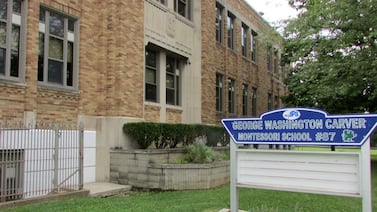Most of the students in Michigan’s Class of 2020 didn’t have proms, graduation ceremonies, or big parties because of the emerging pandemic, but they did manage to graduate in slightly larger numbers than the Class of 2019.
State data released Friday show 82% of the students in the 2020 class graduated on time, up from 81.41% the year before. It’s the fifth year in a row the state’s graduation rate has increased.
The data was released by the state’s Center for Educational Performance and Information.
State Superintendent Michael Rice called it good news in a statement Friday.
“It’s a tribute to the hard work last spring of educators, students and parents.”
The increased graduation rate comes after last year’s seniors had their school year upended just as they were preparing for the usual graduation pomp and circumstance. Buildings were ordered shut down in mid-March, a closure that extended until the end of the school year.
The state graduation rate is the percent of students graduating who began as freshmen four years earlier. The dropout rate for the 2019-20 school year was 7.7%, down from 8.36%.
Some students don’t show up in either of the graduation rate of dropout rate states because while they did not graduate on time, they are still enrolled in school and on track to graduate.
The statewide increase in graduation rates was driven partly by rate increases a handful of large districts. The Lansing district’s graduation rate shot up by five points. Oak Park and Hamtramck saw six and seven point increases respectively.
In the Detroit Public Schools Community District, the state’s largest, the graduation rate was 72.45%, down from 75.84% the previous year. The district’s rate has declined for three years in a row, a drop that coincides with the transfer of high schools that were part of the Education Achievement Authority back into the district.
The EAA was a state-operated school system that was created to operate some of the worst performing schools in Detroit. It disbanded in 2017.
Detroit Superintendent Nikolai Vitti, during a school board finance committee meeting Friday morning, discussed the EAA’s effect on the district’s overall graduation rate.
“This is not about graduation rates on their own declining,” he said. “It’s the impact and lag of the EAA schools being integrated back into the school district.”
That being said, Vitti noted, “I don’t want the board to get the impression that we’re simply … cleaning our hands and saying we’re not accountable for the graduation rates. That is farthest from the truth.”
He said the district has created its own accountability system for high schools that emphasizes graduation rates. And in the years since he became superintendent in 2017, the district has switched to a credit recovery program for students that is more effective. The district has also created a graduation tracker that shows how many students are on track to graduate on time.
“We use that data to problem solve with principals,” Vitti said. “And it allows us to intervene.”







